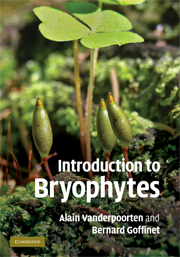9 - Bryophytes in a changing world
Published online by Cambridge University Press: 05 June 2012
Summary
The natural corollary of the narrow relationship between bryophytes and their environment is that a great deal of variation in community composition and physiological behaviour is to be expected whenever changes in environmental conditions occur. In the current context, global change brought about by human activities has increasingly been an area of concern. Bryophytes, perhaps more than many other organisms, are highly sensitive. Their response to climate change is obvious from the reconstruction of paleovegetation based on the analysis of macrofossils (see Section 7.1), so that a great deal of changes in species distribution and community composition is to be expected in the current context of global warming (Box 7.1). The response of bryophytes to an increasingly polluted world is no less dramatic. This is because bryophytes, being poikilohydric, mostly lack a protective, highly hydrophobic cuticle and are, therefore, directly exposed to pollutants. As a result, pollutants may bind on cell walls, eventually pass through the cell membrane and affect metabolism.
In this chapter, we review how pollution affects bryophyte ecophysiology and community composition. We focus on airborne pollution, which arguably constitutes the main threat to ecosystems (Lee 1998). We then assess how understanding the response of bryophytes to these changes can be used as one indicator to monitor the quality of the environment. Finally, we examine the mechanisms by which bryophytes are able to adapt and survive in a changing environment.
Information
- Type
- Chapter
- Information
- Introduction to Bryophytes , pp. 214 - 231Publisher: Cambridge University PressPrint publication year: 2009
